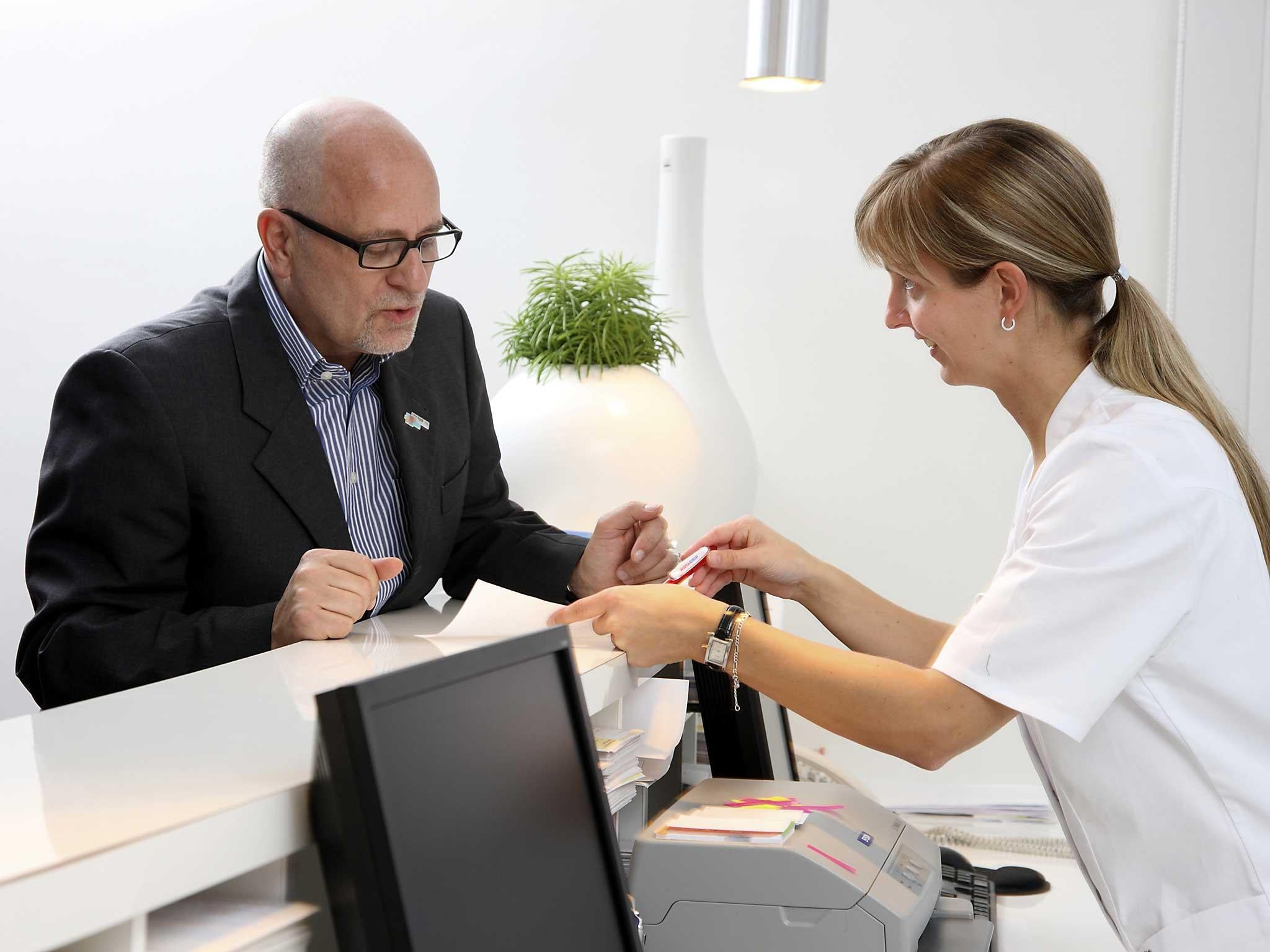A seasoned hypochondriac's guide to dealing with your GP's inevitably horrible receptionist
I assume these people are trained in a complex on the outskirts of Phnom Penh where receptionists are sent for training by erstwhile ex-Khmer Rouge death camp guards


In any ranking of modern history’s most insoluble mysteries, the one I am about to pose would not make to it number one. That honour would be disputed by such familiar conundrums as “Why did Alf Ramsey take Bobby Charlton off against West Germany in the 1970 World Cup quarter final?”; “What, if anything, came before the Big Bang?”; and (a favourite with all mature TV viewers), “If travel broadens the mind, what happened to Judith Chalmers?”
Yet even if it isn’t the Novak Djokovic of timeless enigmas, I ask that this fixture be considered for the top 10 again in light of new research about NHS patient dissatisfaction: where on earth (if earthlings they are) do GPs’ receptionists come from?
The many theories propounded down the decades include a secret cloning programme, in which genetic material from the late archetypal battleaxe Joan Sanderson (Mrs Richards in Fawlty Towers) is gene-spliced with DNA from the even later Caligula. I don’t buy that, much preferring the notion of a complex on the outskirts of Phnom Penh where receptionists are sent for training by erstwhile ex-Khmer Rouge death camp guards.
The chances are that we will never learn the truth of it. But one thing we do know is that a leading cause of patient resentment is the receptionist. Reporting a Cancer Research survey of 2,000 people, the Journal of Public Health reveals (if that’s the word; stories come no more Dog Bites Mannish than this) that receptionists deter patients from seeing GPs. Almost 40 per cent of respondents said they “dislike having to speak to the GP receptionist about symptoms”. You think?
As a hypochondriac of astounding range and invention, I am not opposed to discussing symptoms on principle. Quite the reverse. Whether outlining my own or listening to those of others in the guise of a talented (if technically unqualified; don’t you find medical diplomas a touch petit bourgeois?) diagnostician, no day passes without such a discussion. But the one class of human with whom I don’t want to discuss symptoms is the receptionist.
This has nothing to do with him or her (let’s be honest: her) being a stranger. I have discussed rectal bleeding with an American within four minutes of her taking the seat next to me on a Virgin train to Edinburgh. But that tourist, from Nebraska, was a courteous audience with no intent to belittle the symptoms to keep me out of the consulting room. She wasn’t about to emit the barely perceptible little sigh which screams “malingerer”, and suggest I take the matter up with a pharmacist. She had no desire to leave me on hold with the Stylophone Philharmonic recording of The Four Seasons, before eventually returning with the grudging offer of an appointment with a latex-gloved hand in a month.
When I joined my local surgery a few years ago on a friend’s recommendation, I naively assumed I had the razor cunning to penetrate the barbed-wire indifference. If it was a middle ear infection, for instance, what could be easier than making up an imminent flight which might burst the eardrum?
A few months later, that same friend rang, squealing with laughter. On staggering round to the surgery that morning with possible heart attack symptoms (palpitations, chest pain, and so on), he was brusquely told that under no circumstances could he see the doctor at such short notice. If John Hurt rang to report that an alien life form was bursting through his ribcage, he’d be advised to take paracetamol, drink plenty of fluids, and ring back in a couple of days if he hadn’t improved.
Of course, there are exceptions. The receptionist at my mother’s surgery (big shout out to Agnes!) is a warm, angelic soul, though since my mother spends more time there than at home, Agnes may well be confusing her with a fellow member of staff.

Of course we appreciate that fielding the frustration and often aggression of the lividly fobbed off is liable to harden a heart. And of course the increased pressure on doctors’ time may partly explain why a more fitting job description for their gatekeepeers would be “GP’s bouncer”.
Yet the youngest and least experienced seem as fierce as their venerable colleagues, and the dominion of the rude and sarcastic stretches back to a far less stressful era. When recently rewatching A Very Peculiar Practice, Andrew Davies’ masterly satire on early 1980s redbrick life set in a university’s surgery, it struck me that the caricature of receptionist would work as well today.
In London’s Chinatown, waiters at the cheapest restaurants are fabled for using nuclear rudeness to get the punters out as quickly as possible. It is a tactic better suited to turning over Soho tables than scaring off patients in a first-world healthcare system.
Most of us invited to wait three or more weeks for an appointment will survive this intriguing new philosophy of “recover or die”. But we are not all malingerers and idiots demanding antibiotics for a cold. At worst, there is a risk of cancers becoming harder to treat if a patient postpones seeing the doctor because they are too embarrassed to audition their intimate symptoms to a icily intimidating voice on the phone.
Rudeness is bad enough when it is metaphorically lethal. When it threatens to become literally so, perhaps it’s time for the NHS to cancel the contract with the Khmer Rouge Training College, and hire some ordinarily humane receptionists instead.
Join our commenting forum
Join thought-provoking conversations, follow other Independent readers and see their replies
Comments